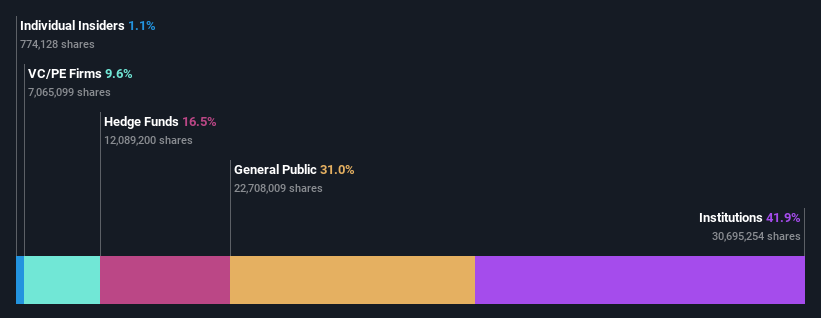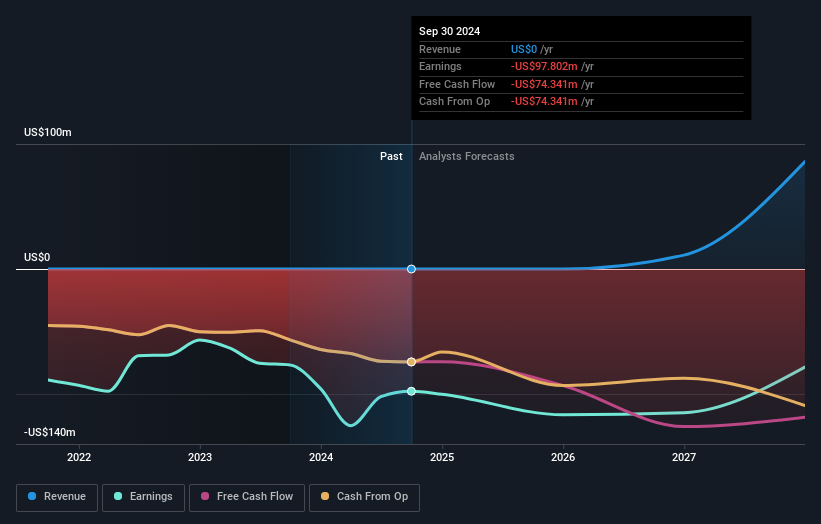- United States
- /
- Pharma
- /
- NasdaqGS:MNMD
Institutional investors are Mind Medicine (MindMed) Inc.'s (NASDAQ:MNMD) biggest bettors and were rewarded after last week's US$73m market cap gain

Key Insights
- Institutions' substantial holdings in Mind Medicine (MindMed) implies that they have significant influence over the company's share price
- A total of 9 investors have a majority stake in the company with 52% ownership
- Insiders have bought recently
If you want to know who really controls Mind Medicine (MindMed) Inc. (NASDAQ:MNMD), then you'll have to look at the makeup of its share registry. And the group that holds the biggest piece of the pie are institutions with 42% ownership. Put another way, the group faces the maximum upside potential (or downside risk).
And things are looking up for institutional investors after the company gained US$73m in market cap last week. The one-year return on investment is currently 75% and last week's gain would have been more than welcomed.
In the chart below, we zoom in on the different ownership groups of Mind Medicine (MindMed).
See our latest analysis for Mind Medicine (MindMed)

What Does The Institutional Ownership Tell Us About Mind Medicine (MindMed)?
Institutions typically measure themselves against a benchmark when reporting to their own investors, so they often become more enthusiastic about a stock once it's included in a major index. We would expect most companies to have some institutions on the register, especially if they are growing.
As you can see, institutional investors have a fair amount of stake in Mind Medicine (MindMed). This implies the analysts working for those institutions have looked at the stock and they like it. But just like anyone else, they could be wrong. It is not uncommon to see a big share price drop if two large institutional investors try to sell out of a stock at the same time. So it is worth checking the past earnings trajectory of Mind Medicine (MindMed), (below). Of course, keep in mind that there are other factors to consider, too.

Our data indicates that hedge funds own 16% of Mind Medicine (MindMed). That's interesting, because hedge funds can be quite active and activist. Many look for medium term catalysts that will drive the share price higher. The company's largest shareholder is Commodore Capital LP, with ownership of 11%. With 9.6% and 7.7% of the shares outstanding respectively, Deep Track Capital, LP and BlackRock, Inc. are the second and third largest shareholders.
On further inspection, we found that more than half the company's shares are owned by the top 9 shareholders, suggesting that the interests of the larger shareholders are balanced out to an extent by the smaller ones.
While it makes sense to study institutional ownership data for a company, it also makes sense to study analyst sentiments to know which way the wind is blowing. Quite a few analysts cover the stock, so you could look into forecast growth quite easily.
Insider Ownership Of Mind Medicine (MindMed)
While the precise definition of an insider can be subjective, almost everyone considers board members to be insiders. The company management answer to the board and the latter should represent the interests of shareholders. Notably, sometimes top-level managers are on the board themselves.
Insider ownership is positive when it signals leadership are thinking like the true owners of the company. However, high insider ownership can also give immense power to a small group within the company. This can be negative in some circumstances.
We can see that insiders own shares in Mind Medicine (MindMed) Inc.. As individuals, the insiders collectively own US$5.6m worth of the US$527m company. Some would say this shows alignment of interests between shareholders and the board. But it might be worth checking if those insiders have been selling.
General Public Ownership
The general public, who are usually individual investors, hold a 31% stake in Mind Medicine (MindMed). While this size of ownership may not be enough to sway a policy decision in their favour, they can still make a collective impact on company policies.
Private Equity Ownership
Private equity firms hold a 9.6% stake in Mind Medicine (MindMed). This suggests they can be influential in key policy decisions. Some might like this, because private equity are sometimes activists who hold management accountable. But other times, private equity is selling out, having taking the company public.
Next Steps:
I find it very interesting to look at who exactly owns a company. But to truly gain insight, we need to consider other information, too. Take risks for example - Mind Medicine (MindMed) has 4 warning signs (and 2 which don't sit too well with us) we think you should know about.
But ultimately it is the future, not the past, that will determine how well the owners of this business will do. Therefore we think it advisable to take a look at this free report showing whether analysts are predicting a brighter future.
NB: Figures in this article are calculated using data from the last twelve months, which refer to the 12-month period ending on the last date of the month the financial statement is dated. This may not be consistent with full year annual report figures.
New: Manage All Your Stock Portfolios in One Place
We've created the ultimate portfolio companion for stock investors, and it's free.
• Connect an unlimited number of Portfolios and see your total in one currency
• Be alerted to new Warning Signs or Risks via email or mobile
• Track the Fair Value of your stocks
Have feedback on this article? Concerned about the content? Get in touch with us directly. Alternatively, email editorial-team (at) simplywallst.com.
This article by Simply Wall St is general in nature. We provide commentary based on historical data and analyst forecasts only using an unbiased methodology and our articles are not intended to be financial advice. It does not constitute a recommendation to buy or sell any stock, and does not take account of your objectives, or your financial situation. We aim to bring you long-term focused analysis driven by fundamental data. Note that our analysis may not factor in the latest price-sensitive company announcements or qualitative material. Simply Wall St has no position in any stocks mentioned.
About NasdaqGS:MNMD
Mind Medicine (MindMed)
A clinical stage biopharmaceutical company, develops novel products to treat brain health disorders.
Excellent balance sheet slight.


